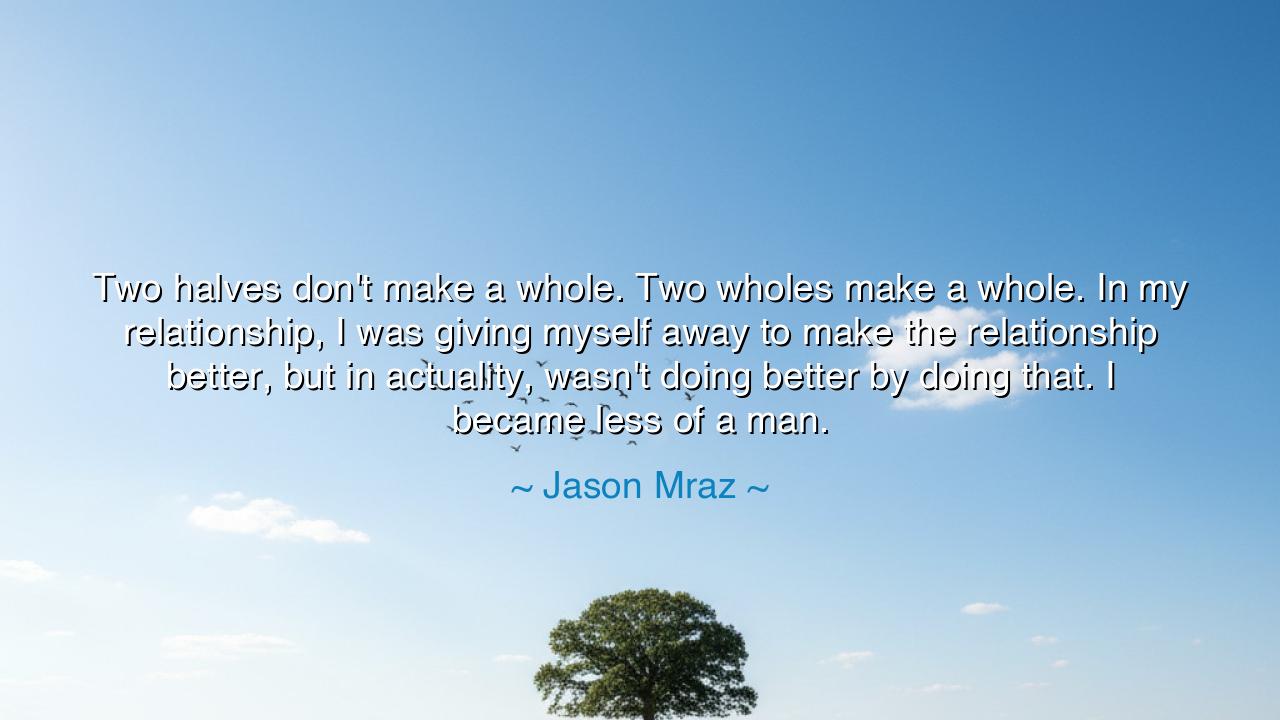
Two halves don't make a whole. Two wholes make a whole. In my
Two halves don't make a whole. Two wholes make a whole. In my relationship, I was giving myself away to make the relationship better, but in actuality, wasn't doing better by doing that. I became less of a man.






The words of Jason Mraz rise like a warning to all who seek love without first knowing themselves: “Two halves don’t make a whole. Two wholes make a whole. In my relationship, I was giving myself away to make the relationship better, but in actuality, wasn’t doing better by doing that. I became less of a man.” At first, the phrase sounds like a riddle, but it is truth spoken with the clarity of experience. For what he teaches is that love is not meant to complete what is broken, but to unite what is already strong.
The idea that two halves make a whole is an old illusion, born of longing. Many believe they must find another to “complete” them, as though they are fragments waiting to be fixed. But Mraz unmasks this falsehood. To enter a union from emptiness is to place upon the other the burden of your incompleteness. Such a bond is fragile, for it is built not on strength, but on need. True relationships, he reminds us, are made of two souls who are already full, already secure, already whole within themselves.
This wisdom echoes across history. Consider Marcus Aurelius, the Stoic emperor. In his Meditations, he reminds himself that no man should lean wholly upon another for happiness, but should be self-sufficient, drawing strength from reason and virtue. Had Mraz read his words, he would have found resonance: when he gave too much of himself, he ceased to be his own anchor, and thus the relationship faltered. To give blindly is not love, but self-erasure; and what remains is not union, but weakness.
Another mirror of this truth lies in the legend of Queen Eleanor of Aquitaine. She stood not as a shadow to her kings, but as a sovereign in her own right—educated, powerful, and strong-willed. Her relationships with Henry II and her children were turbulent, yet she never diminished herself to preserve them. Instead, she remained whole, and it was from that wholeness that her legacy endured. History remembers her not as half of another, but as a complete force who stood alongside others as their equal.
Mraz’s confession, “I became less of a man,” is not weakness but courage. To admit that one has surrendered too much of the self is to recognize the sacred need for balance. Love asks for sacrifice, yes, but not the sacrifice of identity. A true union does not demand that one partner dissolve into the other; it demands that each bring the full richness of their being, and from that meeting create a greater harmony. Two flames together do not dim—they burn brighter, so long as neither extinguishes itself.
The lesson, O seeker, is plain: do not enter love as a fragment. Do not look for another to repair your soul. Build yourself first. Stand tall, learn who you are, and cherish your own strength. Then, when you meet another who has done the same, your bond will not be one of desperation, but of abundance. In that abundance, the whole meets the whole, and together they form a union that uplifts both.
Practical wisdom flows from this: tend to your own growth. Cultivate independence, integrity, and joy in solitude. Do not give so much of yourself that nothing remains. When you love, give deeply—but give from fullness, not emptiness. And when you find yourself diminishing for the sake of peace, pause and remember Mraz’s words: “Two halves don’t make a whole. Two wholes make a whole.”
So let this teaching be carried forward: true love is not two broken pieces clinging for survival, but two complete souls choosing to walk together. In such relationships, each remains strong, each remains whole, and together they weave a union that no storm can break. For love is not meant to consume you—it is meant to magnify the light that is already within you.






CCCute Chua
Jason Mraz’s insight about becoming less of a person when over-giving in a relationship makes me reflect on my own experiences. It's easy to lose ourselves when we try to make someone else happy, but is it possible to give without diminishing who we are? What’s the key to maintaining that balance, where both partners are whole and give to each other without feeling like they’re losing parts of themselves?
VKVy Khanh
I find Jason Mraz’s perspective interesting, but it raises a difficult question—how do we know when we’re giving too much? Relationships often require compromise and sacrifice, but where do we draw the line between supporting someone and losing ourselves? Can love really flourish if both individuals aren't strong and whole on their own? It’s a tough balance, and I wonder how others navigate this challenge.
DHDuc Huy
This quote hits hard because it makes me think about how often we sacrifice parts of ourselves for others. Jason Mraz suggests that giving too much of ourselves can make us feel less whole, but isn't that part of love and connection? At what point does self-sacrifice become self-neglect? Can a healthy relationship thrive without both people retaining their independence and strength as individuals?
NTKim Anh Nguyen Thi
Jason Mraz's reflection on relationships brings up an important question—how do we maintain our individuality while still being part of a partnership? It seems like the idea of ‘giving yourself away’ in a relationship can lead to losing yourself. But how do we find balance? Can we truly be our best selves in a relationship if we’re constantly compromising or putting the other person first?